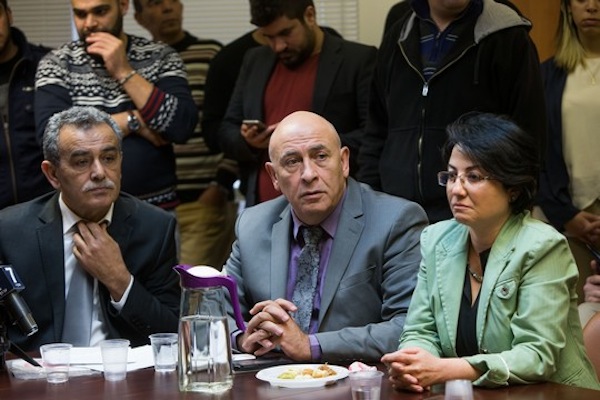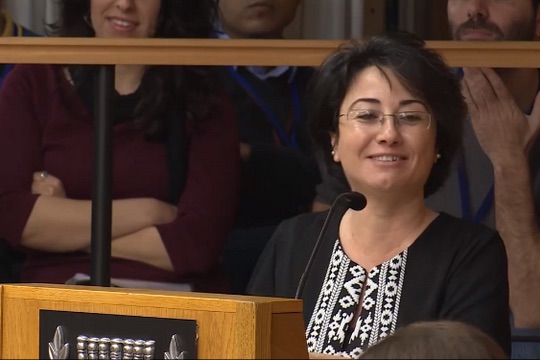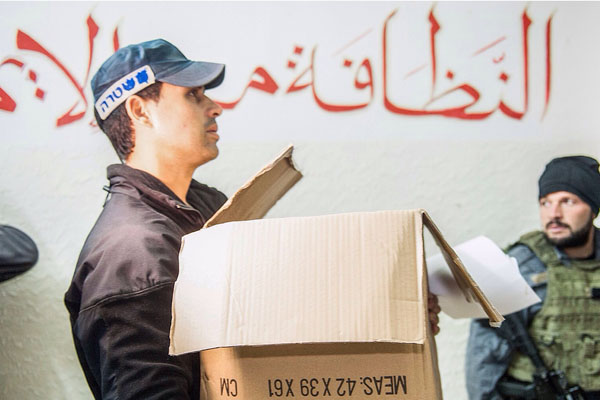Balad isn’t the first political party in Israel to be suspected of violating campaign finance laws. But it is the first one to have its members arrested in overnight, commando-style raids.

There are two possible ways to describe the dramatic, highly-publicized arrest of dozens of activists and senior members of the Balad party earlier this week:
“The police opened a wide spreads investigation against Balad over suspicions of fraudulently transferring millions of shekels to the party’s coffers during the 2013 elections.”
Or: “In an overnight operation security focus raided the homes of dozens of Palestinians, arresting them for pro-Palestinian activism.”
Most Hebrew-language media outlets that reported on the story chose a variation on the first headline. In my eyes, however, the second headline is far more accurate for a number of reasons.
Firstly, I have no idea how Balad’s election fundraising campaign functioned, whether in 2013 or in general. As a supporter of the party, I want to believe that nothing illegal was done. However, what I do know for a fact is that there is hardly a single party in Israel that was not been suspected or convicted of violating Israel’s campaign finance law. I am also sure that the members of these parties were not arrested in the middle of the night, as if in a top-secret commando operation. Not even when suspicions were far greater and more severe — not even when the suspects were high-level officials. This isn’t the “language” in which Israel functions in the political-civil sphere. In Israel, night raids and arrests are a “natural” response to security threats.
It’s no coincidence, of course: the State of Israel has for years attempted to remove Balad from the political arena and turn the party into a security threat. Lacking the desire or even the ability to deal with the kind of discourse Balad promotes — perhaps the only party that has consistently presented a detailed vision for a real democratic future for this country — Israel prefers to turn it into a threat.
Think about how many times the words “terrorists,” “traitors,” or “spies” come up in the context of Balad. Not just from talkbackers on the Internet, but from ministers and MKs in the Knesset plenum. The sentiment behind every single attempt to delegitimize the party, from the repeated attempt to have the Knesset Ethics Committee ban its members from running in the elections to their suspension for meeting with families of Palestinian attackers, is one: Balad is not a legitimate political voice, but rather a threat to the very existence of the state.

Even hints about the source of the money — “cash that came in suitcases from Qatar” — were intended to raise the national anxiety levels. “Arab money,” as opposed to, say, money that comes from evangelists with anti-Semitic tendencies, is code word for “shady deals that endanger the state.” Thus it does not take much for this to turn into a military-style operation, reminiscent of the kind of things that occur regularly in the occupied territories.
One must wonder, then, why the state would want to define a political party as a threat while stripping it of its legitimacy rather than accepting it, if only to maintain a facade of democracy. It seems that beyond the banal response, “because it can,” which reflects the Right’s absolutist hold on power, which allows it to “remove its gloves,” there are two additional explanations:
Israel simply does not have the tools to deal with a non-violent national-civil struggle by Israel’s Palestinian citizens. Therefore it prefers to mark them as struggles that threaten state security and escalate them. When the state deems nonviolent actions, such as the Gaza flotillas or the BDS movement, as terrorism that subvert the state’s existence, it moves them from the civil sphere into one in where it writes all the rules: the security sphere.
Defining Balad as a security threat exempts Israel from the need to deal with the party’s legitimate national and civil demands. In this way, Sunday’s arrests achieved their goals, even if they are only making a mountain out of a molehill.
The second point is that Balad is the group most actively opposed to the deal Israel seeks to “sell” its Palestinian citizens: benefits afforded to citizens in exchange for erasing their national identity. Want culture? We’re happy to provide it. Culture Minister Miri Regev will promise to double the budget for Arab culture, as long as its representatives pledge allegiance to the flag. But should an Arab theater put on a play about Palestinian national identity, it could be subject to closure.

As long as its relationship is based on this “deal,” the state is willing to act with largesse, such as the case of the plan to transfer billions of shekels over to Arab authorities in order to minimize the discrimination against Israel’s Arab public. But what happens when some of the representatives of this public are unwilling to minimize their demand vis-a-vis this deal, and demand the right to influence the definition of the state itself so that it expresses their national identity as well? That’s when they turn from political opponents into a real threat, and must be dealt with as necessary.
A little under a year ago, the state outlawed the northern branch of the Islamic Movement, the largest Arab movement in the country. This measure was preceded by several calculated steps that turned the movement into a “security threat” and made it possible to convince the public that it needs to be outlawed. This included raiding the movement’s offices, arresting its officials, and more. The draconian decision passed without even the slightest opposition. All that was needed were the magic words: “security threat.”
If there is good reason to suspect Balad of fraud, then the issue must be investigated and those responsible must be held accountable. But years of harassment and persecution show that this goes way beyond issues of money handling. Step by step, Israel is turning Balad into a veritable security threat, ready for the final act in which it expels the party from the political arena. The outlawing of the Islamic Movement was proof that this is possible, at almost all costs.
This article was first published in Hebrew on Local Call. Read it here.


